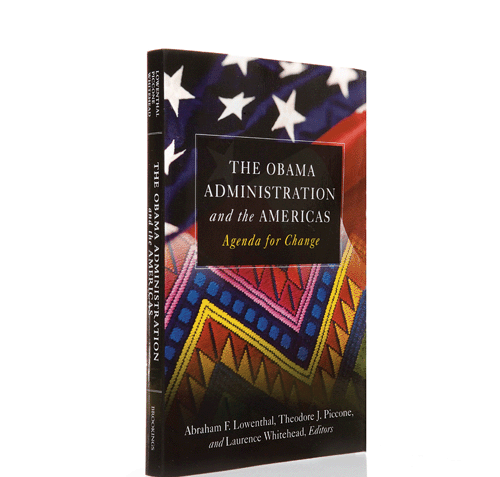As the new U.S. administration completes its first six months in office, the authors of The Obama Administration and the Americas: Agenda for Change may be pleased to see that the themes they outline—dialogue, collaboration and multilateralism—are reflected in President Barack Obama’s initial outreach to Latin America. Despite this thematic convergence, however, the volume falls short in offering many new substantive ideas.
This collection of essays by 14 observers of the region is the result of the Washington DC-based Brookings Institution’s rediscovery in 2008 of the importance of Latin America. The writers were each asked to address “whether and how the U.S. can effectively support the strengthening of democratic governance and the more consistent application of the rule of law.” The editors— Brookings nonresident senior fellow Abraham F. Lowenthal, Brookings deputy director of foreign policy studies and senior fellow Theodore J. Piccone and Nuffield College fellow in politics Laurence Whitehead—have focused the majority of the volume on what they call the “hard cases:” Colombia, Haiti, Cuba, Venezuela, Bolivia, and Mexico.
While the result has its shortcomings, the editors are correct to focus on the state of democratic governance in Latin America. As Daniel Zovatto of the International Institute for Democracy and Electoral Assistance notes in his essay, the political paradox of the region is that “while democracy is becoming more firmly entrenched, it is also being questioned…[for] its failure to deliver on its promise.”
The need to articulate and implement policies that affirm U.S. support for democracy as a guiding principle of the Western Hemisphere is all the more important given the hemisphere’s failure to respond to the Sandinistas’ blatant electoral theft of the Managua mayorship in the November 2008 elections. Similar concerns arise from Venezuelan President Hugo Chávez’ persistent assault on Venezuelan democracy and individual freedoms, and Bolivian President Evo Morales’ manipulation of the constitutional rewriting process to perpetuate his grasp on power. In each instance, democrats lost and authoritarians won.
In their contributions, Lowenthal, Zovatto, Piccone, Whitehead, former Colombian foreign minister Rodrigo Pardo, the Carter Center’s Jennifer McCoy, and Oxford University fellow George Molina hold the behavior of the U.S. to be primarily responsible for democracy being on the defensive. They see greater multilateralism as an answer to re-engaging the forces of democracy.
But not many details are offered on how this multilateralism is to be achieved, or whether it should take the form of ad-hoc coalitions or be conducted through the United Nations or Organization of American States (OAS). More specificity would have been helpful on how to effectively garner and deploy a multilateral effort that would actually strengthen democratic governance and the rule of law. In the case of Haiti, for instance, where there is now a long record of multilateralism,
Daniel P. Erikson of the Inter-American Dialogue and Juan Gabriel Valdés, a former head of the UN Stabilization Mission in Haiti, give separate analyses of the continuing challenges. But the authors fall short in describing what can be done to help Haiti build more stable institutions and generate greater economic growth. Multilateralism is not a solution if it does not produce results beyond spreading the blame for policy failures…
Read two Letters to the Editor responding to this review.





